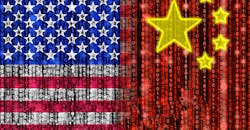Technology — from 5G networks to artificial intelligence — is increasingly the most contentious aspect of China’s relationship with America.
Both Washington and Beijing see leadership in these fields as being crucial not just for their economies but for their security. That’s a challenging gulf to bridge.
Take Huawei for example. The U.S. has lobbied countries to not use its 5G equipment and limited its access to critical American technology. Washington argues these steps are needed because if Huawei dominates communications networks, the biggest winners are Chinese spies.
What Beijing sees, however, is America drumming up fears without evidence and using security as an excuse to limit China’s rise.
As conflicted as those two views may be, they are perhaps not intractable. There are some technology issues the U.S. and China can agree on. Intellectual property is one example.
As Chinese companies become more innovative, Beijing has as much incentive to protect IP as America has to demand it. This week showed that’s starting to happen, with American and European business groups expressing cautious optimism about a new Chinese investment law, partly because it offers better protection of intellectual property.
If U.S. pressure helps to bringing forward policies that also benefit China, then both sides win. And maybe with enough wins, you get a bridge.
Hong Kong
Carrie Lam’s days as Hong Kong’s chief executive may be numbered. It was reported this week that Beijing is thinking about potentially replacing her by as soon as February. Of course that raises the question of how much her departure would help the situation. It would have little effect on the fundamental issues that have fed unrest, problems such as income inequality and questions around how much sway Beijing should have over the city. What's more, it seems unlikely that her replacement would have dramatically different positions on those issues, given they'd have to be chosen by the same stakeholders who selected Lam. But then there is also the argument that by just having someone who is not her in office it could open the door for a reset in tensions.
Corporate Risk
Talking about the situation in Hong Kong has been plenty risky for public figures, be they sports stars or CEOs. Walt Disney's Bob Iger seemed to walk that line fairly well this week, especially when compared with some of the rancor aimed at Los Angeles Lakers star Lebron James for his comments on the subject. It's a tricky balance. Publicly supporting an executive's right to expression, as the National Basketball Association has, might win a company support in the U.S. but exacerbate hurt feelings in China. And as the Chinese market becomes more important for the likes of Disney, Apple and General Motors, the less room there will be for error. Of course Chinese brands are one cohort that could benefit if growing political tensions prompts more calls for consumers to buy local brands.
Elon Musk
The first Tesla cars produced at the company's factory in Shanghai are set to begin rolling off the production line late this year. That will cap what has been a relatively fast and smooth process, highlighting not just how great a focus Elon Musk has placed on gaining a foothold in China, but of how eager China has been to have him. Beijing's warm welcome has included exempting Tesla's vehicles from a 10% purchase tax and allowing the company to own 100% of its local venture. In turn, the factory in Shanghai will generate jobs at Tesla and its suppliers, and it will also communicate in a very public way that China remains open for business.
Pork Supplies
China's hog apocalypse may be making a turn for the better. The country's larger scale pig farms are now beginning to rebuild their herds and might see a recovery in their number of sows by as early as next year, according to government researchers. A pickup in pork production would be welcome relief for local consumers, who've seen the price of China's staple meat double. The international impact could be significant as well. China's shortage has already fueled a surge in U.S. exports and pushed up prices from Auckland to Vancouver. But with a possible recovery in herd sizes still off on the horizon, supplies remain constrained and prices high.
About the Author
Bloomberg
Licensed content from Bloomberg, copyright 2016.
